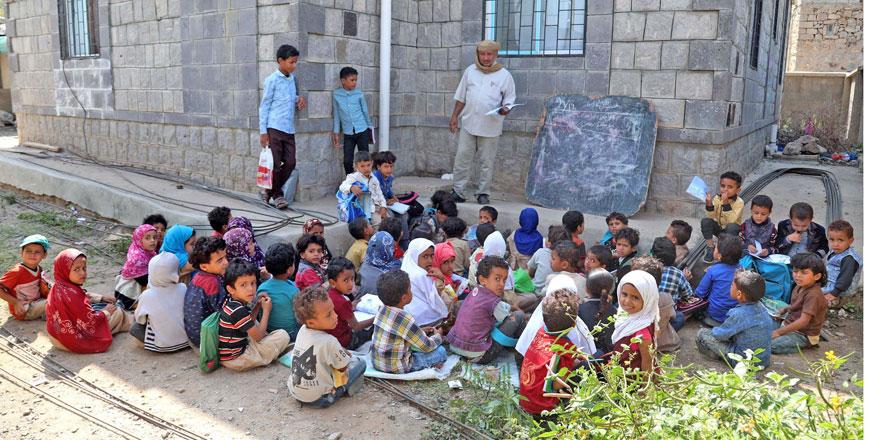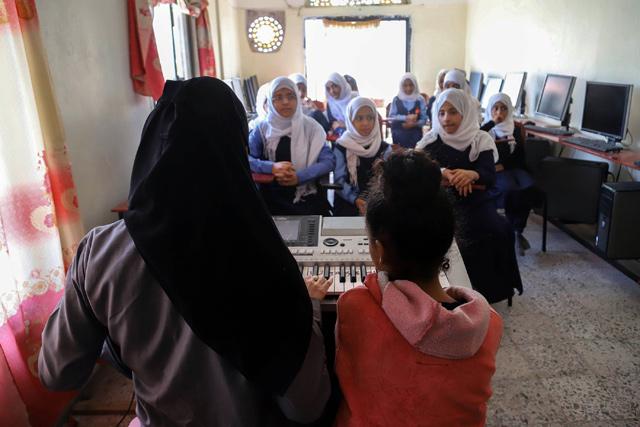You are here
Home-turned-school helps Yemen children return to classroom
By AFP - Oct 08,2018 - Last updated at Oct 08,2018
TAEZ, Yemen — By converting his home into a makeshift school, a teacher in Yemen’s southwestern city of Taez has helped hundreds of children in the war-torn country return to the classroom.
Three years of fighting between the Saudi-backed government and Shiite Houthi rebels have left Yemen’s education system in tatters.
Around 2 million children across the country now have no access to schooling, according to the United Nations children’s fund (UNICEF), and the war that has pushed Yemen to the brink of famine shows no sign of waning.
But for more than 700 boys and girls of primary school age, Adel Al Shurihi’s three-storey home in the government-held neighbourhood of Wadi Al Slami is a welcome chance to keep up their studies.
“There are two options, either these children end up on the streets or they gather inside the building to study because most schools are closed,” Shurihi told AFP.
“Inside, at least, they are protected from stray bullets.”
Patriotic duty
Book bags in tow, the students line up outside the breeze-block building dubbed Al Nahda school to do their morning exercise, recite Koranic verses and sing the national anthem.
The home-turned-school has been taking in students since 2016, with the government providing used books for the classes.
But with no budget and a crew of volunteer teachers, Shurihi wants the authorities to do more.
“This initiative began as a charity and a good deed, but now the relevant government entities must continue what we started,” he told AFP.
The structure is divided into 13 classrooms — there are no desks or chairs.
AlNahda’s 712 students sit on the floor for their daily lessons, and share two bathrooms — one for girls and one for boys.
They are taught by 28 volunteer teachers, most of whom worked in government schools shuttered due to violence and budget issues.
Safaa Mohammed, who worked at a school that was forced to closed, said it was her national duty to teach Yemeni children.
“Our children were lost when they were not learning,” she told AFP.
“We had to open this school after so many closed since 2015 because of the conflict,” she said.
Even though the school lacks many essential items and the classes are packed, Mohammed still shows up each day to teach without pay.
“It is a patriotic duty to teach before it is a humanitarian issue,” she said.
Grateful
UNICEF estimates that some 4.5 million children in Yemen risk losing access to state schools, as teachers have not been paid in nearly two years.
More than 2,500 schools have been damaged or destroyed, and others are now used as shelters for displaced people or as bases run by armed groups.
Three quarters of Yemen’s population — or 22 million people — are in need of humanitarian aid, including 8 million who need food relief to survive, according to UN figures.
Hafez Mohammed, a student at Al Nahda, said he was “grateful” for the opportunity to press on with his studies.
“This building, which has turned into a school, is closer to us than any government school,” he told AFP.
“We can’t afford studying in private schools or government schools.”
Yemen’s war has put the country’s children at particular risk.
More than 40 per cent of Yemeni girls are married before the age of 15, while three quarters wed by 18, according to UNICEF.
Boys are at risk of being drawn directly into the conflict, fighting as child soldiers in a war that has killed nearly 10,000 people since Saudi Arabia and its allies intervened on the government’s side in 2015.
Related Articles
Taez, Yemen — Twenty Yemeni pupils listen to their teacher with textbooks balanced in their laps as they sit under trees in their
TAEZ, Yemen — The sound of music fills the halls at a school in the Yemeni city of Taez, where little Nazira Al Jaafari sits at a keyboard a
ZINDAH JAN, Afghanistan — Children sit shoulder to shoulder crammed in rows on the floor of a shipping container with lesson books in their


















